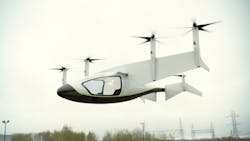Xwing looking toward "all passenger, no pilot" future
SAN FRANCISCO -- Aviation technologies group Xwing is looking has announced $4 million in seed money it intends to invest into autonomous aircraft research and development.
The funding will allow the San Francisco-based company to expand its operations, with money coming from financiers tied to Microsoft, GitHub, Eniac Ventures, Array Ventures and Xamarin.
While many larger modern aircraft and higher-end business jets are equipped with systems that allow for at least some degree of autonomous operation, Xwing aims to create fully-autonomous systems for smaller, cheaper passenger aircraft for what it describes as an "all passengers, no pilot" future.
"Aviation is currently undergoing what will be a seismic shift," said Xwing founder and CEO Marc Piette. "Xwing has brought together experts in optionally-piloted vehicles, unmanned systems and certified avionics to develop key autonomous flight technology to accelerate this change."
The company's current focus centers on key functions related to autonomous flight, including sensing, reasoning and control systems, with the integration of these systems for use on rotorcraft, general aviation fixed-wing and electric vertical takeoff and landing (eVTOL) aircraft now in the works.
The ultimate goal, according to a recent blog post from Piette, is to help alleviate traffic on road infrastructure by making small aircraft affordable and accessible to the general public.
With only about 0.2 percent of the population in the United States licensed as pilots, the demand for small general aviation aircraft trails automobiles by the millions in terms of vehicles sold per year -- thus making autonomously-piloted planes a catalyst to drive aircraft sales and presumably lowering costs.
"Removing the need for a pilot will have a significant impact in opening up the aviation market," Piette wrote. "It allows for substantial decrease in vehicle operating costs, increase in operational efficiency for network operations, and it opens up the market for private ownership significantly."
